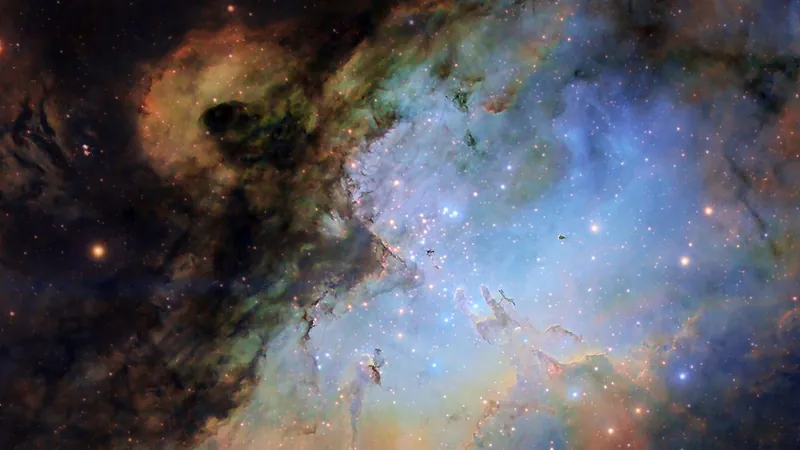
Unlocking the Universe's Secrets: Why 95% of What We Observe Remains a Mystery!
2025-01-22
Author: Nur
Introduction
In his groundbreaking work, "Matter: The Magnificent Illusion," the eminent physicist Guido Tonelli sheds light on one of the universe's most puzzling phenomena: dark energy. This mysterious force, first detected in 1998, has captivated astronomers and physicists alike, revealing that the universe is expanding at an accelerating rate—an astonishing fact that defies previous expectations.
The Discovery of Dark Energy
Initially, astronomers were taken aback by the data suggesting that not only is the universe expanding, but it is also doing so more rapidly than anyone had anticipated. Conventional wisdom held that gravity would slow down this expansion, yet the evidence pointed to a different reality: galaxies are racing away from each other at an ever-increasing pace.
Despite skepticism and multiple investigations into the legitimacy of these findings, researchers, including Saul Perlmutter, Brian Schmidt, and Adam Riess, ultimately recognized this unexpected expansion as a genuine phenomenon. Their extraordinary work earned them the Nobel Prize in 2011 and marked a profound shift in our understanding of cosmic dynamics.
The Nature of Dark Energy
The term "dark energy" was coined to describe this phenomenon, symbolizing the scientists' complete lack of understanding about its nature. This enigmatic energy appears to exert a repulsive force, pushing galaxies apart and seemingly growing in intensity as the universe expands, leaving astronomers grappling with questions that challenge the very foundations of physics.
Theoretical Perspectives
While theories abound—ranging from anti-gravity effects to vacuum energy exerting negative pressure—none have provided a definitive explanation. Interestingly, the concept of a cosmological constant, first introduced by Albert Einstein, has resurfaced in discussions about dark energy. Einstein had initially proposed this constant as a means to stabilize the universe against gravitational collapse, a decision he later deemed a significant misstep. Yet, as we now know, with the universe's chaotic birth and continuous expansion, his ideas may yet have merit.
Recent Research Findings
Recent studies have utilized cosmic background radiation and gravitational lensing to glean more insight into dark energy's distribution. Findings indicate that unlike ordinary and dark matter, which cluster into dense filaments and voids, dark energy is remarkably homogeneous, occupying vast expanses of space uniformly.
Remarkably, recent observations show that this mysterious energy has only become the dominant force in the universe over the past several billion years, with its impact growing more pronounced as time has passed. Researchers continue to explore hypotheses ranging from new fundamental forces to potential anomalies within the fabric of space-time itself, all in an effort to unveil this elusive component of the cosmos.
Conclusion
Despite the staggering advancements in our understanding of the universe, dark energy accounts for approximately 68% of the total mass-energy content, leaving an astonishing 95% of the cosmos shrouded in mystery. Humanity stands at the precipice of knowledge, faced with the fact that we are still puzzled by the fundamental workings of our universe. As we delve deeper into these cosmic enigmas, one thing remains clear: the universe still has many secrets to reveal, and the quest for answers continues to stir curiosity and inspire countless generations of scientists.
Are we on the brink of a breakthrough? What other mysteries lie ahead in the endless expanse of space? The exploration of dark energy and its implications for the universe may very well redefine our understanding of reality itself!


 Brasil (PT)
Brasil (PT)
 Canada (EN)
Canada (EN)
 Chile (ES)
Chile (ES)
 Česko (CS)
Česko (CS)
 대한민국 (KO)
대한민국 (KO)
 España (ES)
España (ES)
 France (FR)
France (FR)
 Hong Kong (EN)
Hong Kong (EN)
 Italia (IT)
Italia (IT)
 日本 (JA)
日本 (JA)
 Magyarország (HU)
Magyarország (HU)
 Norge (NO)
Norge (NO)
 Polska (PL)
Polska (PL)
 Schweiz (DE)
Schweiz (DE)
 Singapore (EN)
Singapore (EN)
 Sverige (SV)
Sverige (SV)
 Suomi (FI)
Suomi (FI)
 Türkiye (TR)
Türkiye (TR)
 الإمارات العربية المتحدة (AR)
الإمارات العربية المتحدة (AR)